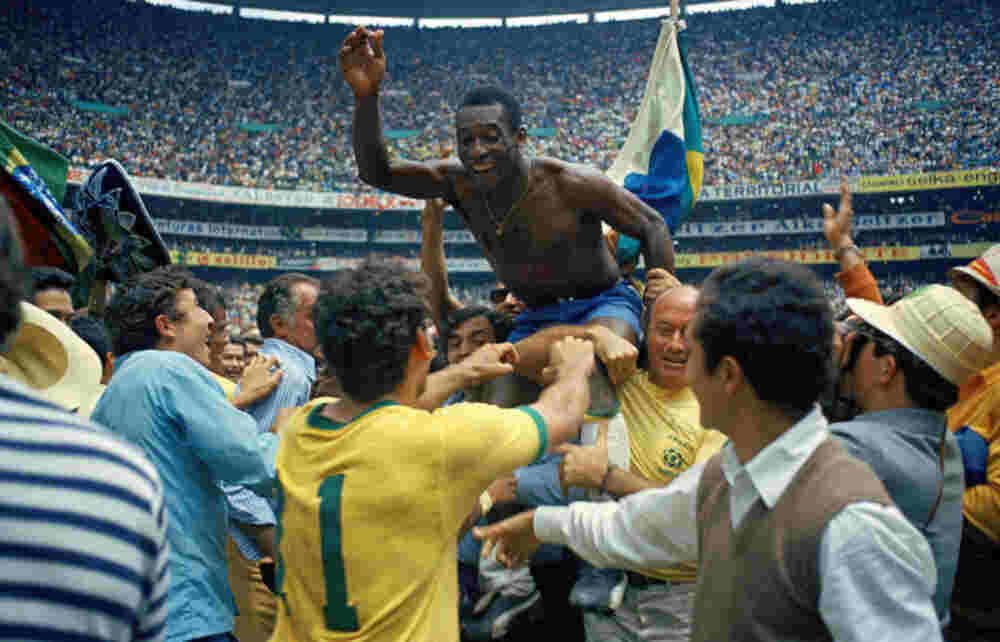The Darkside of Pele
In Brazil, Pele very quickly exceeded the framework of the simple football player, until becoming a minister in the 1990s. The darkside of Pele and the political history of Pelé, however, started in the shadows: that of the dictatorship of the military junta, in power from 1964 to 1985. Under his yoke, the Santos player, declared a “non-exportable national treasure” in 1961, n ever been able to leave Brazil to play in Europe. Even if his Santos club was then one of the best in the world, and the king often justified his immobility by love for his country. Of the silent type on the subject, Pelé has always spared the military junta in its outings, so that we never knew if he was an ally or a prisoner of the dictatorship.
You can be king without reigning. Sacred by the Brazilian people O Rei for his ball-to-foot prowess, Pelé had an influence well off the field in his native country. On more than one occasion, his football has taken on a political dimension, whether he is aware of it or not. So much so that during his retirement from sport, the most famous number ten was appointed Minister of Sports, even drafting a law in his name.
Four years at the Ministry of Sports
Often portrayed as an instrument of propaganda for the dictatorship, Pelé finally broke his silence on the subject in 2021, in a Netflix documentary: “I don’t think I could have acted differently, I’m not a superman or a miracle worker. I was a normal person who God allowed to play football. But I am absolutely certain that I did more for Brazil with my football than many politicians paid to do it.”
The fact remains that in 1995, after having been appointed ambassador of the UN, UNICEF and UNESCO, and having multiplied humanitarian actions, Pelé became politically committed to his country. Already approached by several presidents, this time he accepts the offer of the right-wing social democrat Fernando Henrique Cardoso. Without a political label, Pelé becomes Minister of Sports, at the head of a ministry finally separated from Education. And his project is clear: to reform in depth the national treasure that is football.
First, I wanted clubs to be incorporated, managed transparently and ethically. Second, I wanted to make Brazilian players masters of their careers, so, for example, that at the end of the contract, their club cannot retain any rights over them.
Pelé in his autobiography
His silence, even his docility, with regard to the power of the military, mentioned
The abundant archive images will be an opportunity for a good part of the public to discover or rediscover the genius footballer that was Pelé, capable of changing the course of a match with a touch of the ball. But the film team also took advantage of the rare participation of the ex-number 10 himself in the project to probe the man, who gives up little, and appears physically diminished. The immense pressure, the frustrations, the joys, the marital infidelities, the hidden children, Pelé gives a little to see behind the scenes, up to talking about his relationship with the Brazilian dictatorship.
Read also: Political Systems in the Wolrd | Form of Governments
A troubled relationship with the military dictatorship
Even more disturbing aspect, its relationship with the dictatorship of the military.
During the victory in the World Cup in 1970, Pelé is exploited by the dictatorship.
He agrees to pose alongside the potentate, General Medici. And to see his face used in propaganda posters.
Pelé does not really support the dictatorship but he is silent. Not a word about political prisoners, about torture, about the racial question.
His detractors call him “Negro sim Sinho”, understand Negro in the service of white people.
Above all, Pelé seeks never to get angry with the leaders in power.
Pelé is a 2021 documentary film about the Brazilian footballer Pelé, considered the best player of the 20th century along with Maradona. The film is produced and distributed by Netflix and directed by Ben Nichols and David Tryhorn. Kevin MacDonald, Jon Owen and Jonathan Rogers are executive producers.

Emilio Garrastazu Medici who was the president of Brazil from 1969 to 1974. His authoritarian rule marked the apex of the Brazilian military regime. He supported the coup d’état of 1964 and after the triumph of the revolt was appointed head of the 3rd Army, a military unit based in Porto Alegre. Governo do Brasil, Public domain, via Wikimedia Commons
The Pelé documentary was released on Netflix on February 23, 2021
Story
The film depicts Pelé’s life from childhood, through his footballing triumphs, including his three World Cups (1958, 1962 and 1970) wins, to his final New York Cosmos team. It includes many archival images: of his matches, his interviews, as well as news reels, etc. The film also touches on a bit of the political context in Brazil, including the dictatorship from 1964 to 1985. Much of the history of football and contemporary history is explained through recent interviews with Pelé and other characters important people of the time, including members of his family, coaches, his former teammates of Santos FC where he scored 643 goals in 660 games and of the Seleção, journalists and politicians.
The film recalls that the government of General Emilio Garrastazu Medici notably pushed him to participate in the 1970 World Cup when he did not want to, scalded by an injury during each of the two previous editions.
This 1970 World Cup in Mexico, which closes the film, shows a Pelé without certainties, far from the confident character with an unfailing smile, flying over existence.
His coronation will be that of a fragile man, who will make his team triumph in a supporting role, “the most beautiful moment of (his) life”.
Critical reception, The Darkside of Pele
On Rotten Tomatoes, the documentary holds an 82% approval rating based on 28 reviews, with an average rating of 6.40/105. Andrew Pulver for Britain’s The Guardian, Charlotte O’Sullivan for London’s Evening Standard, Danny Leigh for Britain’s Financial Times and Tara Brady for The Irish Times all gave the film three out of five stars. Jordan Mintzer of The Hollywood Reporter described the film as a “polished, well-meaning biography”, but one that “inspires [neither] love and [or] admiration”.
Sources: PinterPandai, The Wrap, The Nation
Photo credit: El Gráfico, Public domain, via Wikimedia Commons
Photo description: Pelé celebrating the World Cup 1970.



